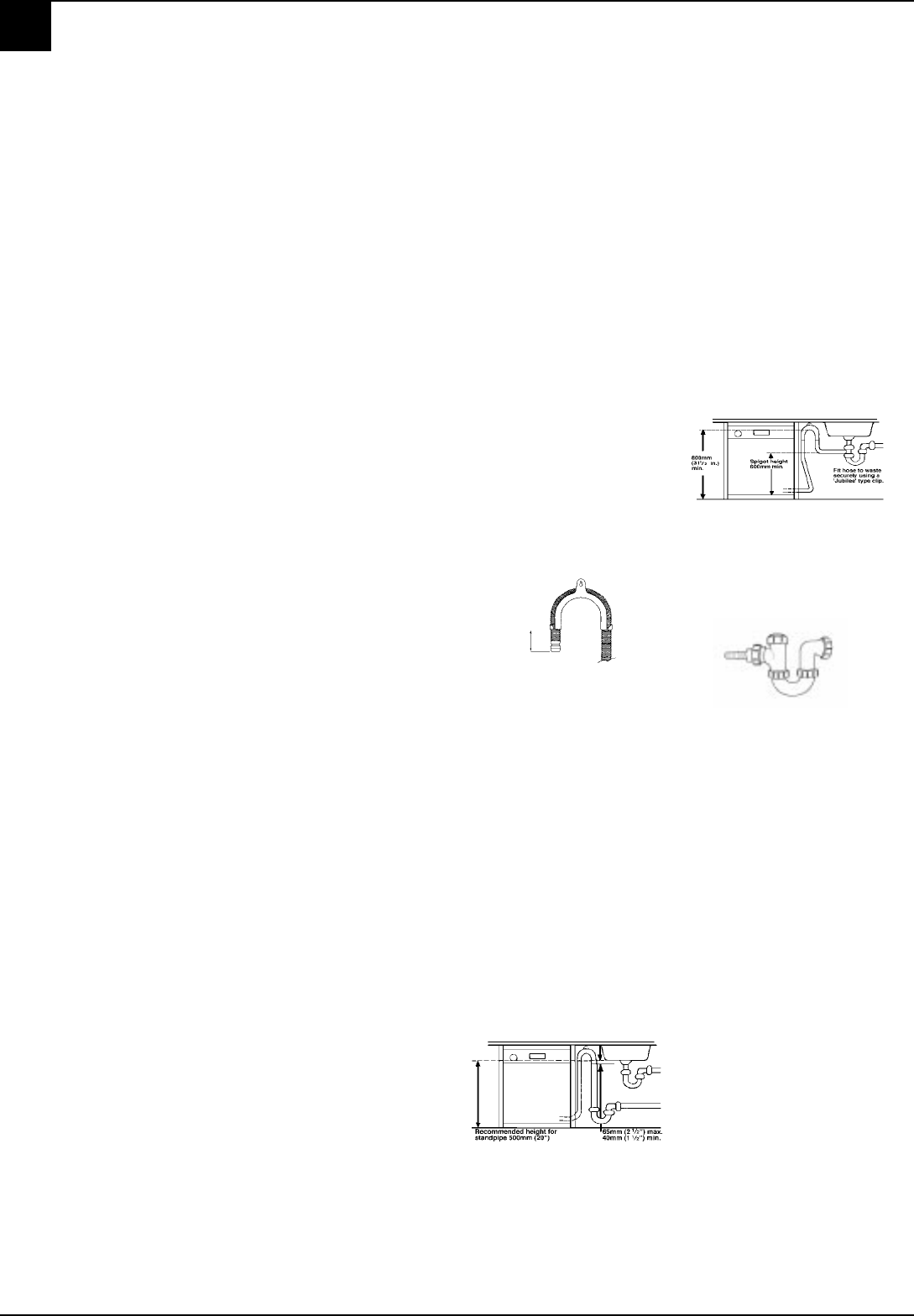
6
D
ISHWASHER
Installation
Cold water connection.
This electric household appliance
should be connected to the water
mains using the cold water supply
hose provided with the appliance
only. Do not use a different hose. In
the event of replacements, use
original spare parts only.
Connect the cold water supply
hose, and making sure that it is
fastened tightly in place . If the water
hoses are new or have been out of
use for an extended period of time,
let the water run to make sure it is
clear and free of impurities before
making the connection. If this
precaution is not taken, the water
inlet could get blocked, causing
damage to your dishwasher.
Choose where you want to install
your dishwasher, you can place it
so that its sides or back panel are
side by side with furniture or up
against the wall. The dishwasher is
provided with water supply and drain
hoses, which can be directed
towards the left or right to facilitate
appropriate installation.
Levelling.
Once the appliance is positioned,
adjust the feet by screwing them in
or out depending on how high you
want it and to level it so that it is
horizontal. Make sure that it is not
inclined more than 2 degrees. If the
appliance is level, it will help ensure
its correct operation.
Height Adjustment
Insert the appliance into the cutout
and then adjust the height using the
screws located on the front bottom
part of the machine. Use a
screwdriver to turn the screws in
the clockwise or anti-clockwise
direction to increase or decrease
the height respectively.
Adjusting the back Feet
Insert the appliance into the cutout
and then adjust the height using the
screws located on the front bottom
part of the machine. Use a
screwdriver to turn the screws in
the clockwise or anti-clockwise
direction to increase or decrease
the height respectively.
Drain hose connection.
WARNING: Connect your
dishwasher drain hose to pipes
which connect to the foul drain
system and not to surface water
drains.
IMPORTANT: For the correct
operation of your dishwasher, it is
essential to comply with the following
information:-
Standpipe:
Ensure that the hose is not pushed
too far down the standpipe.
If the end of your drain hose is fitted
with ‘retaining flaps’, ensure they are
inserted fully into the standpipe. This
will prevent the pipe from jumping
out during installation and use.
DO NOT position the standpipe
near an electrical outlet.
ENSURE that the drain hose is not
kinked and it is routed as shown in
the diagram.
The standpipe should have a bore
of at least 38mm (11/2”). It should
be installed as shown, have a trap
fitted and must discharge into the
same drain system as your
household sink.
It MUST NOT be connected to a
surface water drain.
Sink Waste System:
For under sink drainage:
Before connecting the drain hose,
remove any internal restrictions -
This will prevent a build up of debris
which could cause a blockage.
Remove any restrictions from the
waste spigot and ensure that the
sealing bung is removed. The hose
should be routed, such that it is
raised to a minimum height of
800mm (31/2”).
NOTE: Ensure the sink outlet
pipe has a minimum diamtere of
32mm.
1. Untie the end of the GREY
drainage hose from the rear of
the appliance.
2. Reposition the ‘Hooked End
Support’ as required along the
GREY drainage hose.
3. If fitting an under sink waste
disposal unit, cut out the
membrane, bung or blanking
plug.
Ensure the drain hose is
securely attached, to prevent
it coming away while the
machine is in use and causing
a flood.
Condensation-proof tape.
On some models, a transparent
condensation-proof adhesive tape
has been provided.
It should be stuck onto the lower
side of your wooden worktop to
protect it from the formation of
condensation.
When not provided, this tape can
be requested as a spare part from
authorised retailers.


















